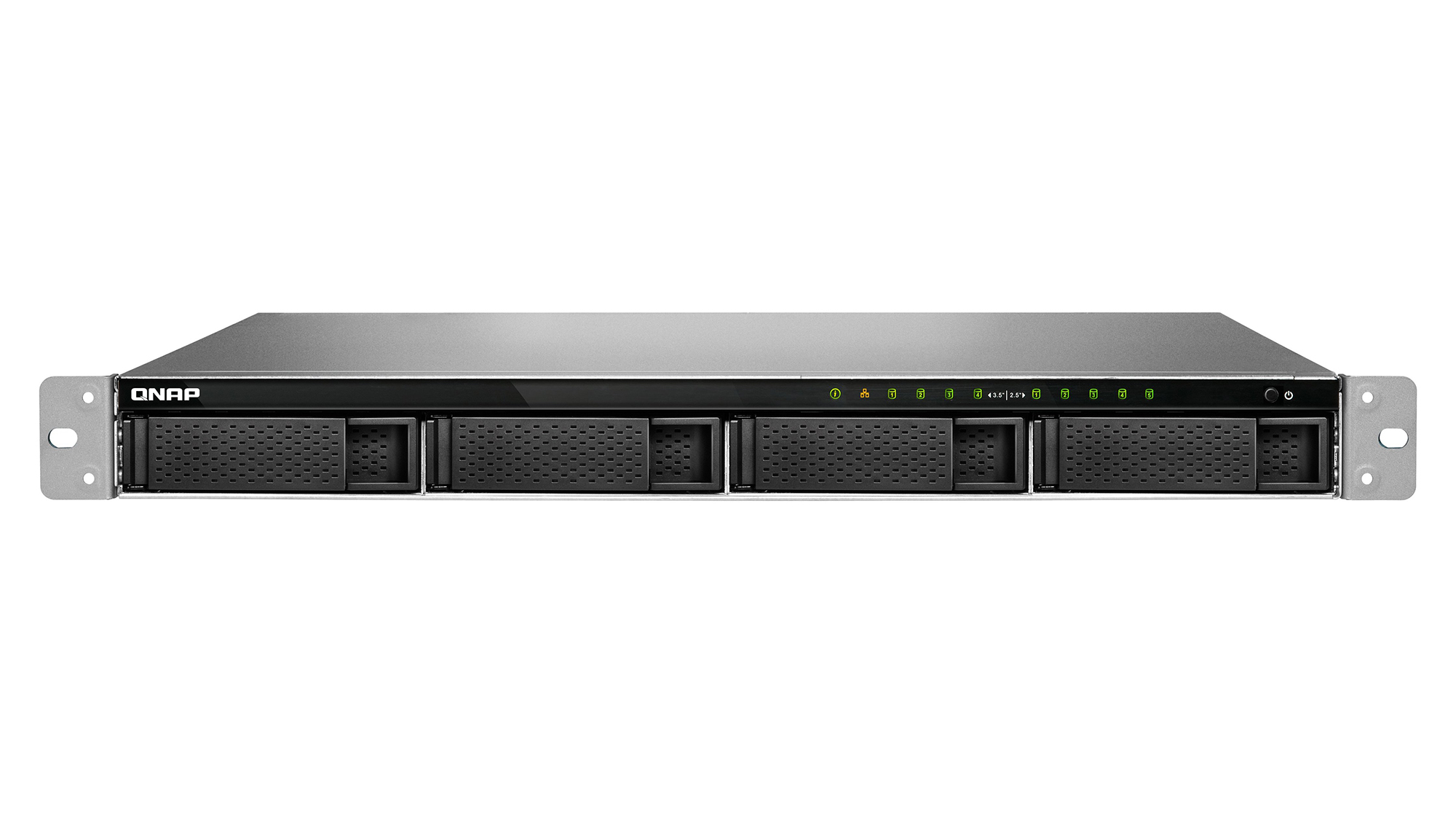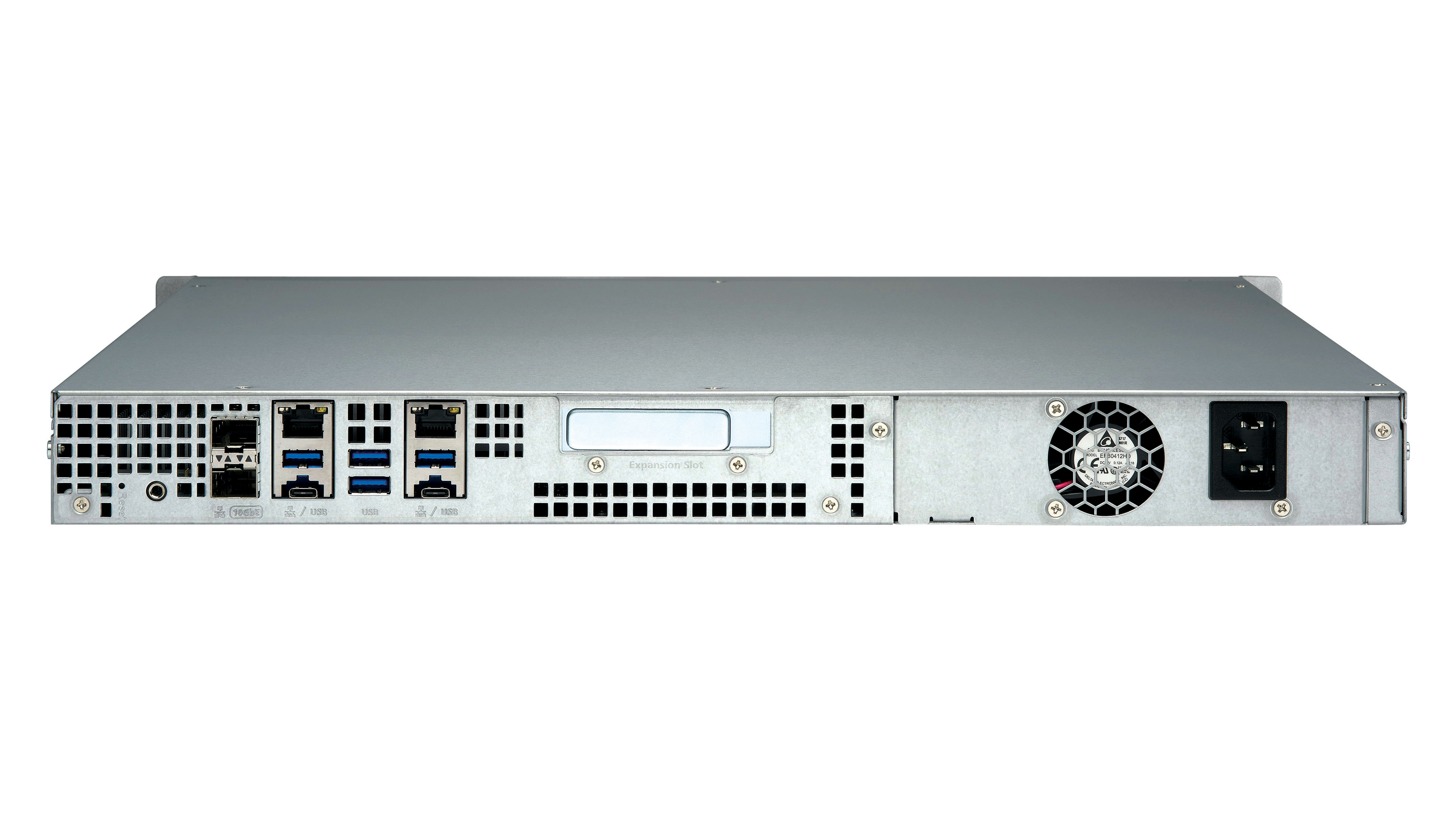Qnap TS-983XU-E2124-8G review: A true storage all-star
Maximum power in minimum rack space, with an innovative storage design


The Qnap TS-983XU-E2124-8G is a little pricey for a 1U rack NAS but SMBs will be hard-pushed to find a more powerful alternative elsewhere. The Xeon E CPU delivers great performance, it’s 10GbE-ready out of the box and the clever internal design offers flexible storage choices.
-
+
Outstanding container and VM support
-
+
Great cloud connectivity
-
+
Blazing performance
-
+
Robust port selection
-
-
Somewhat expensive

There's more to Qnap's TS-983XU than meets the eye - this 1U rack NAS harbours a surprising hardware package. It's the first appliance powered by Intel's latest Xeon E (Entry) CPU, employs server-grade ECC DDR4 memory and supports up to 9 drives.
Its storage credentials become clear with the lid cracked: lurking above the 4 hot-swap LFF bays is a row of five SFF trays. These are designed to accept SATA SSDs which can be used for general storage duties, as a performance enhancing cache or as part of a tier where they receive hot data from Qnap's Qtier 2 feature.
Port choices are outstanding. The TS-983XU sports dual Gigabit and 10GbE SFP+ fibre ports plus 2 Gen2 and 4 Gen1 USB 3.1 ports, and the appliance also has a PCI-e slot which accepts extra 10GbE copper or fibre cards or Qnap's SAS3 storage expansion card.
The Xeon E churns out more heat than low-power Atoms but Qnap counters this with a massive 8in long aluminium CPU heatsink. Noise levels are low with the SPLnFFT iOS app on our iPad reporting a whisper-quiet 38.2dB from one metre in front.
Qnap's QFinder discovery app streamlines deployment and for testing, we installed four 10TB Seagate IronWolf NAS drives and used the quick start wizard to create a RAID5 storage pool. Volumes, NAS shares and iSCSI LUNs are easily created from the Storage & Snapshots app - which has another trick, as it supports snapshots of standard EXT4 file systems and doesn't need them formatted as Btrfs volumes.
Snapshots can be run on-demand or scheduled as often as every five minutes and quickly rolled back to a specific point in time. You can also use the File Station 5 app to browse NAS snapshots and restore individual files or folders.

Tiered storage can be created on a whim as Qtier 2 upgrades existing storage pools on demand. Schedules determine when data migration between the two tiers occurs but note that once created, the SSD storage tier cannot be removed later on.
Its comparatively high CPU core count and large memory capacity makes the TS-983XU a good candidate for virtualization duties and Qnap offers a wealth of apps. The Container Station supports LXC and Docker apps in lightweight containers, Linux Station runs Ubuntu alongside QTS while Virtualization Station 3 can host just about any OS you want.
The appliance is no slouch for performance with a NAS share accessed over 10GbE returning Iometer sequential read and write rates both of 9.2Gbits/sec. We upped the pressure using a second Xeon Scalable server with a dedicated share and saw high cumulative Iometer read and write rates of 18.3Gbits/sec and 15.4Gbits/sec.
Real world performance is great too, with drag and drop copies of a 25GB test file averaging read and write rates of 5.3Gbits/sec and 4.9Gbits/sec. It held firm for backup duties with a 22.4GB folder and 10,500 small files secured to a share at a fast 2.6Gbits/sec.
QTS offers a wealth of cloud apps for remote file syncing, workstation backup or sharing while the Security Counselor keeps you safe by scanning the appliance, highlighting potential security holes and offering sage advice on closing them. The Notification Center takes this to the next level by providing a central platform for managing all system logs plus email, SMS, IM and mobile push status alerts.
The TS-983XU is a little pricey for a 1U rack NAS but SMBs will be hard-pushed to find a more powerful alternative elsewhere. The Xeon E CPU delivers great performance, it's 10GbE-ready out of the box and the clever internal design offers flexible storage choices.
Get the ITPro daily newsletter
Sign up today and you will receive a free copy of our Future Focus 2025 report - the leading guidance on AI, cybersecurity and other IT challenges as per 700+ senior executives
Dave is an IT consultant and freelance journalist specialising in hands-on reviews of computer networking products covering all market sectors from small businesses to enterprises. Founder of Binary Testing Ltd – the UK’s premier independent network testing laboratory - Dave has over 45 years of experience in the IT industry.
Dave has produced many thousands of in-depth business networking product reviews from his lab which have been reproduced globally. Writing for ITPro and its sister title, PC Pro, he covers all areas of business IT infrastructure, including servers, storage, network security, data protection, cloud, infrastructure and services.
-
 Cleo attack victim list grows as Hertz confirms customer data stolen – and security experts say it won't be the last
Cleo attack victim list grows as Hertz confirms customer data stolen – and security experts say it won't be the lastNews Hertz has confirmed it suffered a data breach as a result of the Cleo zero-day vulnerability in late 2024, with the car rental giant warning that customer data was stolen.
By Ross Kelly Published
-
 Women show more team spirit when it comes to cybersecurity, yet they're still missing out on opportunities
Women show more team spirit when it comes to cybersecurity, yet they're still missing out on opportunitiesNews While they're more likely to believe that responsibility should be shared, women are less likely to get the necessary training
By Emma Woollacott Published
-
 OpenAI wants developers using its new GPT-4.1 models – but how do they compare to Claude and Gemini on coding tasks?
OpenAI wants developers using its new GPT-4.1 models – but how do they compare to Claude and Gemini on coding tasks?News OpenAI says its GPT-4.1 model family offers sizable improvements for coding, but tests show competitors still outperform it in key areas.
By Ross Kelly Published